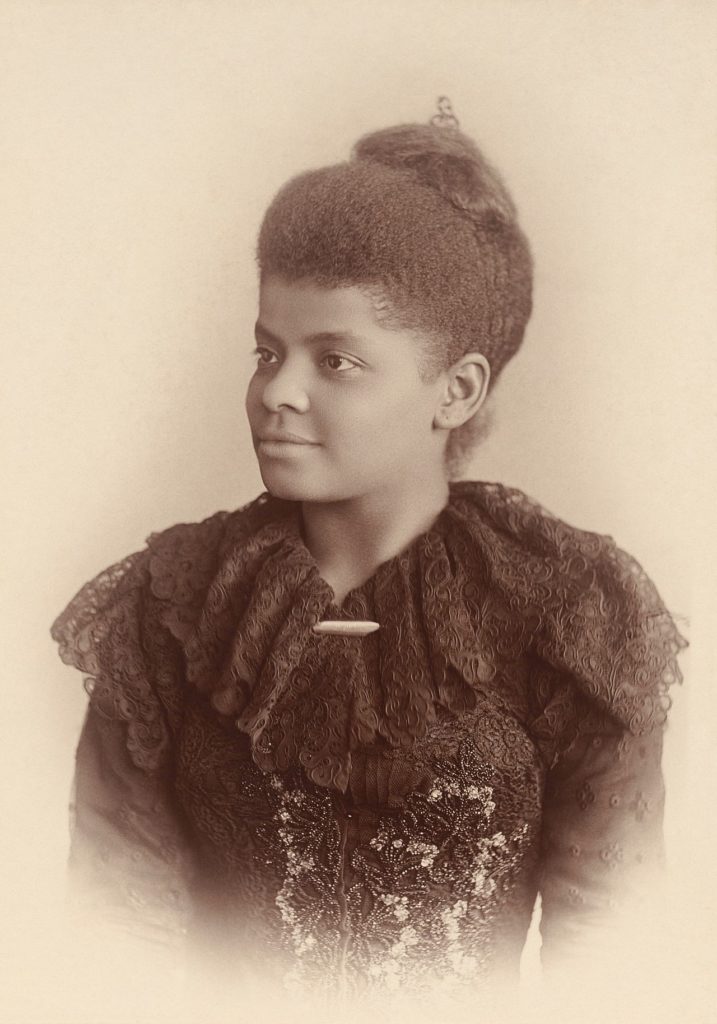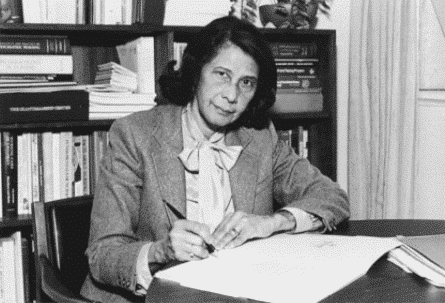
Ida B. Wells, by Mary Garrity restored by Adam Cuerden, Public Domain
Ida B. Wells was born a slave in 1862 but was freed when President Lincoln issued the Emancipation Proclamation. Ida was one of the few African-Americans who was able to go to college in the years following the Civil War, but she had to drop her education after her parents died of yellow fever in 1878. Thereafter, Ida worked as a teacher in a rural school so she could help raise her six siblings and keep the family together.
Although small in stature, Ida was a fierce advocate for human rights. In addition to teaching, Ida became a journalist, writing about social justice issues. She was fired from her teaching job because of her honesty as a journalist.
Ida was outraged at the lynchings and White racial terrorism used to enforce segregation and Jim Crow laws throughout the South. She wrote about lynchings in a very personal way by using the victims’ names. She told their stories and helped her readers understand the personal side of injustice. Her writing showed that the alleged crimes used as pretexts for these killings were either non-existent or greatly exaggerated. From 1877-1950, 4,075 African-Americans were lynched in 12 southern states.
Once her stories gained traction, Ida’s life was in danger. The newspaper offices were burned. Ida was forced to leave the South. But she continued to write about lynchings.
Ida became one of the founders of the NAACP, and began to experience sexism from her colleagues who didn’t believe that a woman should be the leader for civil rights. As a result, she became a leader in the fight for a women’s right to vote.
Ida was ahead of her time in protesting for social justice. This turned off many of her colleagues who advocated for less aggressive actions. Ida died in 1931. The legacy of more aggressive activism was later adopted by Martin Luther King and others.
In tribute to Ida’s memory, the New York Times published her obituary in 2018, eighty-seven years after her death, in a series of overlooked lives lived. In 2020, she was awarded a Pulitzer Prize Special Citation posthumously “for her outstanding and courageous reporting on the horrific and vicious violence against African Americans during the era of lynching.”
It’s remarkable to see the impact that one person can have in bringing awareness of social injustice to the attention of all of us. The name “Ida B. Wells” may not be at the forefront of our minds when we think about the fight for civil rights, but she laid the foundation for civil rights reforms that came long after her death. In the 2020 BLM protests outside the Tennessee State Capitol in Nashville, protestors declared the space to be “Ida Wells Plaza,” and they toppled a statue of Edward Carmack, a journalist and politician who once incited a mob against Ida (leading to the destruction of her newspaper office at the time). Pioneers for progress must often put their own lives in danger for what they believe in.
Just imagine what Ida B. Wells would be writing today about the deaths of so many African Americans at the hands of police. Might these be the modern day equivalent to lynchings that enforced White dominance in the past? Similarly, just imagine what Ida B. Wells would be writing about the voting restrictions that are many states are now putting into place, once again, restrictions that fall most heavily on African Americans and other minorities. Just imagine what grade Ida Wells might give to the United States’ progress on social justice.
* * *
“The way to right wrongs is to turn the light of truth upon them.”—Ida B. Wells
This is part of our “Just Imagine” series of occasional posts, inviting you to join us in imagining positive possibilities for a citizen-centered democracy.


